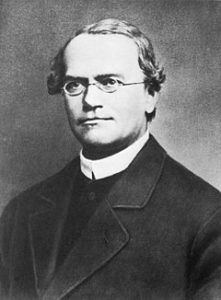The concept of panspermia was first introduced to me by National Lampoon in the form of a joke--one issue of the magazine contained a description of a new version of the video game Space Invaders in which players are encouraged to "knock down the invading sperm from space before they knock up your little sister." Well, I laughed. I don't apologize for my often bizarre sense of humor. In my opinion, one ought to be able to admit that the idea of extraterrestrial sperm coming from outer space to create life on Earth is pretty funny. What's even funnier is panspermia is actually a scientific hypothesis that mostly exists because of a mathematics problem, created by the foolish assumption of secular-minded scientists that creation can come to exist without a Creator. After DNA was discovered, calculations were performed to determine low long it would take "Nature" to produce a double helix without intelligent help. Even the most optimistic projections could not explain how life came to exist so quickly after the Earth was created (approximately 4 billion years ago). The same experts say that the earliest forms of life appeared on Earth 3.6 billion years ago, only 400 million years later. The mathematics problem associated with the origin of life on Earth stems from calculations of how long experts have estimated it would take for DNA to form by luck and random chance. The most optimistic estimates require a lot more time than four hundred million years. Because the universe is many billions of years older than Earth, by invoking panspermia and proclaiming the … [Read more...]
Semantic arguments about the origin of life
A semantic argument means literally having an argument about the precise meaning of a word or phrase. For communication to effectively occur between any two people, there must be some common understanding about the definitions of the words being used. For example, "mostly peaceful" protestors could also be described as "occasionally violent" rioters, depending on one's own perspective. Some people like to watch grown men put on boxing gloves and beat each other into a bloody pulp, but my idea of great entertainment is to watch a verbal jousting match between two intellectuals about a subject that ought to interest all of us, the origin of life. So, as I watched the debate between organic chemist Lee Cronin and synthetic chemist James Tour on the Unbelievable podcast hosted by Justin Brierly, I naturally expected to hear technical jargon and terminology used in their discussion that would sound foreign to me. While I was worried a phrase like “self-assembly of a nanoscale transition metal cluster” would baffle me, it honestly never occurred to me that these two brilliant scientists would be using words like "life" and "information" in a context that I didn't quite understand. https://www.youtube.com/watch?v=3DHvNRK452c After Dr. Tour provided the "textbook" definition of life according to Google (composed of cells, can reproduce, metabolize, etc.), and then said, “Information itself is not life. Would you agree with that? Life has information, but information itself is not life. I can have a piece of paper and write on that piece of paper. That piece of paper … [Read more...]
Selfish genes
According to the scientific definition, a gene is a distinct unit of information, in the form of a specific pattern of nucleotides that comprise part of a chromosome. Roughly translated into English, genes are packets or sequences of DNA (information) that specifically code for one protein, whereas a genome is the full genetic code, or set of rules, for a given organism. For example, the genome of a primate will have specific genes that define the development of fur, arms, and legs, while the genome of a bird will have certain genes that cause development of beaks, feathers, and wings. Both organisms will have genes responsible for developing heart, lungs, eyes, and other internal organs that almost all animals share in common, while also having enough genetic material that a single individual can be uniquely identified out of millions of other people. Only identical twins share the same DNA, but even they can be uniquely identified through their fingerprints. DNA is basically a recipe for how to create an organism from scratch. The average layperson may not be able to recognize an individual gene under a microscope, but any two experts in genetics should be able to identify the specific pattern of a known gene. Most of us have seen enough TV shows like NCIS and CSI delving into forensic police investigative work to know that leaving DNA evidence at the scene of a crime is just about as damning as a voluntary confession—unless the perpetrator can convince the jury that the evidence was planted in an attempt to frame them, the … [Read more...]
A Universe From Nothing
I've been thinking about writing another nonfiction book in the same vein as Divine Evolution and Counterargument for God. The tentative title of this planned new work is God or Good Luck? The difference between this new book and those first two books is that I don't plan on quoting anybody else, only to cite their work and suggest to my readers that they should investigate on their own. No footnotes, or end notes, and no need for a bibliography. In my opinion, not only should you doubt everything I say and investigate it on your own, you should take that approach with anything you read, no matter who wrote it. This time I plan to begin my argument at the beginning and take it straight through to the end in the most coherent manner possible, so the point I'm trying to make is so crystal clear and no one could possibly claim to be confused, not even my harshest critic (who skipped over most of the book he critiqued). Even the title of this proposed new book is pretty self-explanatory...the best explanation of "everything" or anything can be easily boiled down to a dichotomy of only two real choices: it's either God or good luck. Any and every other potential answer can ultimately be shown to be an inferior (and inadequate) substitution for one or the other--whether that suggested alternative is claimed to be science, nature, multiverses, quantum physics, string theory, an invisible wizard who lives in the sky, or even a flying spaghetti monster. Every one of them is a form of good luck, or represents a god. Absent a creator God, the existence of our universe becomes … [Read more...]
Common descent versus common design
My latest "Eureka!" moment while arguing that Charles Darwin's famous theory of common descent with modification is actually a rather pathetic explanation for the modern diversity of life came when I realized that the work of Gregor Mendel had been purloined by evolutionary biologists and made the centerpiece of their argument. Clearly, Mendel's research into genetic recombination demonstrated how descent with modification produced variety in plants, and it stood to reason to assume that the same sort of variety was produced by sexual reproduction by animals. Indeed, anyone brave (or foolish) enough to express skepticism at the idea that Charles Darwin's theory explains the origin of new species had better be prepared for an unprecedented degree of anger, scorn, ridicule, and frequent suggestions to consider remedial biology classes. The question remains: does Mendel's work truly explain the origin of new species, or is that explanation flawed? The idea sounds preposterous on the surface, sort of like the plot of a bad science fiction movie titled Planet of the Furless Apes. Darwin famously scribbled "Monkeys make men" in one of his notebooks to capture the idea that modern evolutionary biologists might call "changes of accumulations in allele frequency changes", which is a fancy way of saying that humans evolved from apes when certain DNA patterns become dominant while others become recessive. Humans lost their fur, grew physically smaller but developed bigger brains, simply because we could. It is theoretically possible, and the only other potential explanation in … [Read more...]



